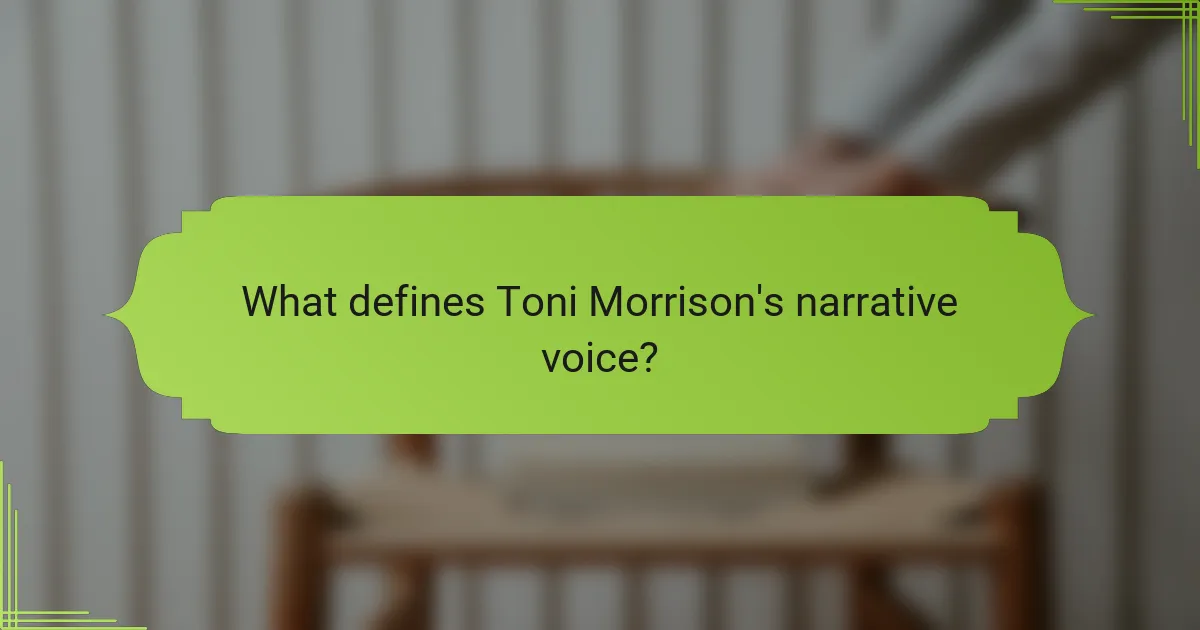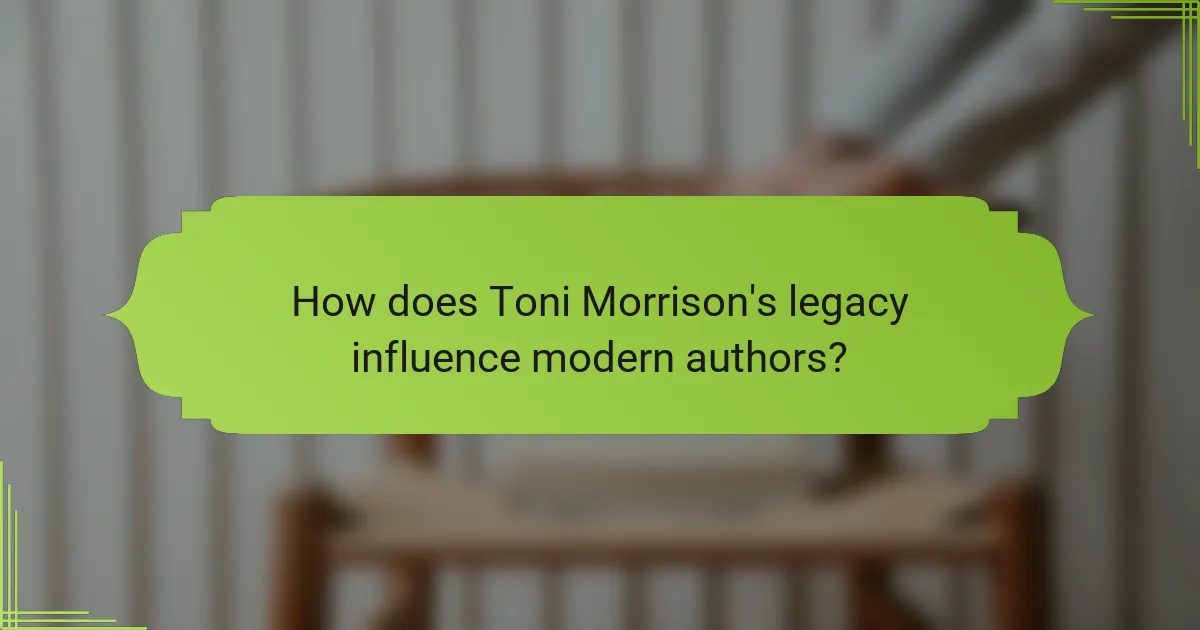Toni Morrison’s literary contributions offer profound insights into African American identity and history. This article examines her unique narrative voice, the historical context shaping her work, and the prestigious literary awards she has received. Morrison’s exploration of race, gender, and identity challenges societal norms and resonates with readers. Her influence on modern authors highlights the importance of diverse perspectives in literature.

What defines Toni Morrison’s narrative voice?
Toni Morrison’s narrative voice is defined by its lyrical style, deep emotional resonance, and exploration of African American identity. Her use of rich imagery and symbolism enhances the themes of history and community, creating a unique reading experience. Morrison’s voice often intertwines personal and collective narratives, reflecting the complexities of cultural heritage. This distinctive approach has earned her numerous literary awards, including the Nobel Prize in Literature.
How does Morrison’s style reflect her cultural background?
Toni Morrison’s style reflects her cultural background through rich narrative voice, historical context, and themes of identity. Her prose often intertwines African American folklore and history, showcasing the unique experiences of her characters. Morrison’s use of symbolism and lyrical language emphasizes cultural heritage, while her exploration of societal issues highlights the impact of race and gender. This distinctive approach has earned her numerous literary awards, further validating her contributions to literature and cultural discourse.
What literary techniques does Morrison employ to enhance her storytelling?
Toni Morrison employs various literary techniques to enhance her storytelling, including rich narrative voice, symbolism, and non-linear timelines. Her unique narrative style often incorporates multiple perspectives, allowing readers to engage deeply with characters’ emotions. For example, she uses symbolism to convey complex themes, such as the significance of water in “Song of Solomon.” Additionally, Morrison’s historical context enriches her narratives, providing a profound backdrop that informs character development and plot progression. Her works have garnered numerous literary awards, highlighting her impact on literature and culture.

How does historical context shape Morrison’s work?
Historical context significantly influences Toni Morrison’s work by shaping themes, character development, and narrative voice. Her novels often reflect the African American experience, drawing from historical events like slavery and civil rights. For instance, “Beloved” explores the trauma of slavery, while “Song of Solomon” addresses identity and heritage. Morrison’s unique attribute lies in her ability to intertwine personal narratives with broader historical contexts, creating a rich tapestry that resonates with readers. This profound connection to history has earned her numerous literary awards, highlighting the impact of context on her storytelling.
What major historical events influence her narratives?
Toni Morrison’s narratives are significantly influenced by historical events such as slavery, the Civil Rights Movement, and the experiences of African Americans. These events shape her exploration of identity, community, and resilience. Morrison’s work often reflects the socio-political landscape of her time, emphasizing the lasting impact of history on personal and collective narratives. Her unique ability to weave these historical contexts into her storytelling enhances the depth and authenticity of her characters and themes.
How do Morrison’s works address themes of race and identity?
Toni Morrison’s works profoundly explore themes of race and identity through rich narratives and character development. Her novels often depict the complexities of African American experiences, highlighting the intersection of personal and collective identities. For example, in “Beloved,” Morrison addresses the haunting legacy of slavery, illustrating how it shapes individual and communal identities. The historical context of her narratives provides depth, as she intertwines personal stories with broader societal issues, revealing the struggles and resilience of her characters. Morrison’s unique narrative voice and her ability to convey the emotional weight of race and identity have earned her numerous literary awards, including the Nobel Prize in Literature.

Which literary awards has Toni Morrison received?
Toni Morrison has received numerous prestigious literary awards, including the Nobel Prize in Literature in 1993 and the Pulitzer Prize for Fiction in 1988 for her novel “Beloved.” Other notable awards include the National Book Critics Circle Award and the Presidential Medal of Freedom. These accolades highlight her significant contributions to literature and her unique narrative voice.
What is the significance of the Nobel Prize in Literature for Morrison’s career?
The Nobel Prize in Literature significantly elevated Toni Morrison’s career, establishing her as a pivotal voice in American literature. This accolade recognized her profound exploration of African American identity and history through rich narratives. Winning the prize in 1993, Morrison became the first African American woman to receive this honor, marking a unique milestone in literary history. The recognition brought her work to a global audience, enhancing her influence and inspiring future generations of writers.
How do her awards reflect her impact on contemporary literature?
Toni Morrison’s awards highlight her profound impact on contemporary literature through recognition of her unique narrative voice and exploration of historical context. Her Nobel Prize in Literature in 1993 underscores her influence, as she became the first African American woman to receive this honor. Additionally, her Pulitzer Prize for “Beloved” in 1988 emphasizes her ability to address complex themes of race, identity, and trauma. These accolades reflect her role in shaping literary discourse and elevating marginalized voices, illustrating the lasting significance of her work in modern literature.

What are the common themes in Toni Morrison’s literature?
Toni Morrison’s literature often explores themes of identity, race, and the African American experience. Her narrative voice uniquely combines lyrical prose with deep emotional resonance. Historical context plays a critical role, reflecting the complexities of racial dynamics in America. Morrison’s work has garnered numerous literary awards, highlighting her significant contributions to literature.
How does Morrison explore the complexities of family dynamics?
Morrison explores the complexities of family dynamics through intricate character relationships and historical context. Her narratives often reveal how familial bonds are influenced by societal issues like race and class. For example, in “Beloved,” the trauma of slavery profoundly impacts family structures, showcasing both resilience and fragility. Morrison’s unique narrative voice allows readers to experience the emotional depth of these relationships, emphasizing themes of love, loss, and identity. This approach highlights how family dynamics are shaped by both personal and collective histories.
What role does memory play in her storytelling?
Memory plays a crucial role in Toni Morrison’s storytelling by shaping character development and historical context. Her narratives often intertwine personal memories with collective experiences, creating a rich tapestry of cultural identity. This approach allows readers to engage deeply with characters’ emotional landscapes. Morrison’s use of memory highlights themes of trauma, resilience, and the impact of history on individual lives, enhancing the overall narrative depth.

In what ways does Toni Morrison’s work challenge societal norms?
Toni Morrison’s work challenges societal norms by addressing race, gender, and identity through powerful narratives. Her unique narrative voice highlights the complexities of African American experiences, often subverting traditional storytelling techniques. Morrison’s historical context enriches her themes, reflecting societal injustices and personal struggles. She received numerous literary awards, underscoring her impact on literature and culture.
How do her characters embody resistance and resilience?
Toni Morrison’s characters exemplify resistance and resilience through their struggles against systemic oppression and personal trauma. They navigate complex social realities, reflecting the strength found in community and identity. For instance, characters like Sethe in “Beloved” confront their pasts, embodying the fight for dignity and healing. Morrison’s narrative voice amplifies these themes, showcasing the depth of human experience and the enduring spirit in the face of adversity.
What critiques does Morrison offer on American culture?
Toni Morrison critiques American culture by highlighting its racial injustices, historical amnesia, and the marginalization of Black voices. She emphasizes the need for a deeper understanding of history and identity. Morrison’s work reflects the complexities of American society, urging readers to confront uncomfortable truths. Her narratives often reveal the impact of systemic racism and the struggle for self-identity within a dominant culture that frequently overlooks or distorts Black experiences.

How does Toni Morrison’s legacy influence modern authors?
Toni Morrison’s legacy profoundly influences modern authors through her narrative voice, historical context, and numerous literary awards. Her distinct style encourages writers to explore complex themes of identity, race, and community. Morrison’s focus on marginalized voices has inspired contemporary authors to embrace diverse perspectives in their storytelling. Additionally, her recognition with prestigious awards, such as the Nobel Prize, validates the importance of literary contributions that challenge societal norms. As a result, many modern authors strive to emulate her depth and authenticity in their works.
Which contemporary writers cite Morrison as an inspiration?
Several contemporary writers cite Toni Morrison as an inspiration, including Chimamanda Ngozi Adichie, Jesmyn Ward, and Colson Whitehead. These authors highlight her profound narrative voice and historical context. Adichie admires Morrison’s ability to blend personal and collective histories. Ward often references Morrison’s exploration of race and identity in her own work. Whitehead acknowledges Morrison’s influence on his storytelling techniques and themes.
What elements of her style are evident in today’s literature?
Toni Morrison’s style is evident in today’s literature through her distinctive narrative voice and deep exploration of historical contexts. Her use of lyrical language and rich symbolism influences contemporary writers. Morrison’s emphasis on African American experiences highlights cultural identity, enriching modern narratives. Additionally, her literary awards, including the Nobel Prize, underscore her lasting impact on literature, inspiring new generations of authors.
What best practices can writers learn from Morrison’s approach to storytelling?
Writers can learn several best practices from Toni Morrison’s storytelling approach. First, embrace a strong narrative voice that reflects cultural depth. Second, weave historical context seamlessly into the narrative to enhance authenticity. Third, focus on character development, making them multidimensional and relatable. Lastly, prioritize themes of identity and community, as these resonate universally.